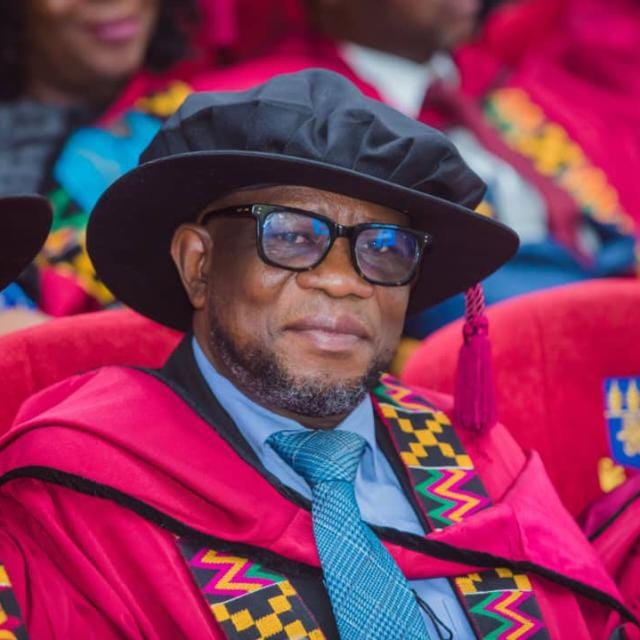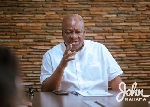Manifesto briefs: NDC's pre-tertiary education reform policies
 Prof. Michael Kpessa-Whyte
Prof. Michael Kpessa-Whyte
The NDC's 2024 manifesto outlines a compelling vision for educational reform in Ghana, prioritizing increased investment, teacher empowerment, curriculum relevance, and equitable access.
These policy proposals, grounded in a deep understanding of the challenges facing Ghana's education system, offer a strong argument for the NDC's ability to effect meaningful and sustainable improvements in the sector. Here are a few highlights:
A Fully Fund the Free SHS Programme
The manifesto further emphasizes the NDC's commitment to "fully fund the Free SHS/TVET policy", indicating a dedication to ensuring the financial sustainability of the program.
This pledge aligns with the NDC's broader emphasis on increased investment in education.
The NDC's manifesto highlights a commitment to "aggressively expand" educational investments, including restoring the Ghana Education Trust Fund (GETFund) and preventing its collateralization for other projects. NDC manifesto also identifies areas for improvement within the Free SHS policy.
The NDC proposes to "leverage improved infrastructure towards phasing out the double track" and "harmonize the academic calendar across secondary schools".
These proposals indicate a focus on addressing concerns regarding the implementation of the Free SHS policy, particularly the double-track system, which has been criticized for its potential impact on learning outcomes and educational quality.
To ensure the participation of all stakeholders, the proposal also intends to ensure that private schools are integrated into the overall FSHS framework to address some of the existing challenges associated with access.
Additionally, the NDC plans to "promote school farms to ensure sustainable food supply to the schools”.
This proposal suggests a focus on enhancing the self-sufficiency of schools and potentially reducing the reliance on external food procurement, which has been a point of contention in the Free SHS programme.
Furthermore, the NDC manifesto commits to "abolish the double-track system to restore a stable academic calendar" and "provide a dedicated and sustainable funding source for quality secondary education by ring-fencing a percentage of our oil proceeds”.
These proposals directly address concerns regarding the implementation and long-term sustainability of the Free SHS programme, particularly the financial burden and potential disruption to the academic calendar caused by the double-track system.
Financial Commitment and Teacher Empowerment
The NDC distinguishes itself through its unwavering commitment to increased funding for education.
The manifesto pledges to "aggressively expand" investments in education, including bolstering the Ghana Education Trust Fund (GETFund) and ensuring its dedicated use for educational purposes.
The NDC's promise to reverse the GETFund's collateralization, which has been criticized for diverting resources away from essential educational needs, highlights the party's dedication to prioritizing education funding.
The NDC's approach to teacher welfare also demonstrates a profound understanding of the crucial role teachers play in delivering quality education.
Abolishing the teacher licensure examination, deemed an unnecessary barrier, and reinstating automatic employment for qualified teachers demonstrate a commitment to streamlining the process and attracting talent to the profession.
Additionally, the NDC's pledge to improve teachers' conditions of service through increased salaries, housing provisions ("Teacher Dabr3" Project), and vehicle ownership assistance programs directly addresses teacher motivation and well-being. These initiatives, taken together, showcase the NDC's understanding of the importance of valuing and supporting teachers as the backbone of a thriving education system.
Curriculum Relevance and Future-Ready Skills
The NDC's proposed curriculum reforms signal a commitment to preparing students for the demands of the 21st century. Integrating STEM, vocational skills, digital literacy, and civic education into the secondary school curriculum aligns with global trends and equips students with the knowledge and skills essential for success in the modern workforce.
The NDC's recognition of the value of early childhood education through its "Bright Beginnings Initiative" demonstrates a holistic understanding of educational development.
By focusing on early learning and ensuring a smooth transition into formal schooling, the NDC aims to lay a strong foundation for lifelong learning.
Moreover, the NDC's pledge to support Islamic education by investing in infrastructure and resources for Islamic Colleges of Education highlights its commitment to inclusivity and respecting diverse educational needs.
Equitable Access and Addressing Systemic Challenges
The NDC's dedication to equitable access is reflected in its proposal to extend Free SHS to private schools, ensuring that all students, regardless of their financial circumstances, have the opportunity to receive quality secondary education.
This initiative aims to level the playing field and promote equal opportunities for all.
The NDC also recognizes the importance of addressing systemic challenges within the education system.
Decentralizing the procurement of school supplies aims to tackle concerns about corruption and delays associated with the centralized system implemented by the NPP.
By giving greater control to local authorities, the NDC seeks to enhance transparency, accountability, and efficiency in the provision of essential resources to schools.
The NDC's commitment to strengthening special needs education through infrastructure improvements, resource allocation, and integration of students with disabilities into the regular education system further underscores its focus on inclusivity and ensuring that all learners have the opportunity to reach their full potential.
Conclusion
The NDC's 2024 manifesto presents a compelling case for its ability to drive a transformational change in Ghana's education system.
Through a combination of increased investment, teacher empowerment, curriculum reform, and a strong focus on equitable access, the NDC's educational reform policies demonstrate a comprehensive and forward-looking approach to building a stronger, more inclusive, and future-ready education system for all Ghanaians.
In addition, the party’s commitment to continuing the Free SHS program while addressing key implementation challenges and ensuring its financial sustainability is thoughtful.
The focus on school farms and educational quality further reinforces the NDC's dedication to providing a valuable and beneficial educational experience to all Ghanaian students.
Prof. Michael Kpessa-Whyte
University of Ghana
Source: Prof. Michael Kpessa-Whyte
Trending Features

Analysis of 2024 Presidential and Parliamentary results
04:47
The golden gamble of the Gold Coast is ‘galamsey’
11:48
Was Dr Agordzo demoted from Superintendent to Deputy for Misconduct?
09:19
Mahama's finance minister must exude confidence, be pragmatist & politically correct
07:36
When party loyalty leads: Lessons of a democratic dictatorship and the troubling truths of not being truly Ghanaian
03:54
Mahama’s historic victory: How Lordina Mahama, Julius Debrah & Seidu Agongo stood the test of loyalty
03:26
Ghana witnessed the most impactful creatives campaign by any political party in history this year – Kojo Preko Dankwa
02:05
Renewed hope for Ghana’s poultry industry
16:52
Agordzo the zero rebel: Zero discipline, zero integrity and zero credibility
09:22
Resetting Ghana together: A call to unity of purpose for dear nation
09:32



